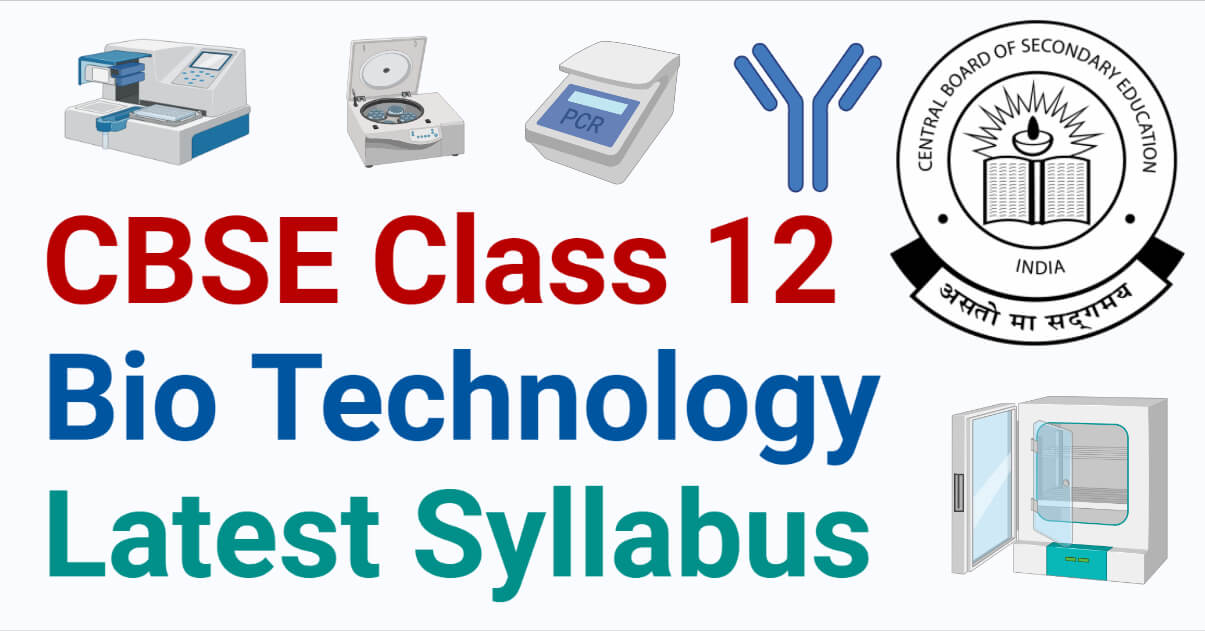
Interesting Science Videos
CBSE Class 12 Biotechnology Course Structure
| Units | Course | Marks |
| Unit- V | Protein and Gene Manipulation | 40 |
| Unit- VI | Cell Culture and Genetic Manipulation | 30 |
| Practical | 30 | |
| Total | 100 |
CBSE Class 12 Biotechnology Theory Syllabus 2022-2023
Unit-V Protein and Gene Manipulation
Chapter-1: Recombinant DNA Technology
Introduction, Tool of Recombinant DNA technology, Making rDNA molecule, Introduction of recombinant DNA into host cells, Identification of recombinants, Polymerase Chain Reaction (PCR), DNA Sequencing.
Chapter-2: Protein Structure and Engineering
Introduction to the world of proteins, Structure-function Relationship in proteins, Characterization of proteins, Protein based products, Designing proteins (Protein Engineering)
Chapter-3: Genomics, Proteomics and Bioinformatics
Gene prediction and counting, Genome similarity, SNPs and Comparative genomics, Functional genomics, Proteomics, Information sources, Analysis using bioinformatics tools.
Unit-VI Cell Culture and Genetic Manipulation
Chapter-1: Microbial Cell Culture and its Applications
Introduction, Microbial nutrition and culture techniques, Measurement and kinetics of microbial growth, Isolation of microbial products, Strain isolation and improvement, Applications of microbial culture technology.
Chapter -2: Plant Cell Culture and Applications
Introduction, Cell and tissue culture techniques, Applications of cell and tissue culture,
Transgenic plants with beneficial traits, Biosafety of transgenic plants
Chapter-3: Animal Cell Culture and Applications
Introduction, Animal cell culture techniques, Applications of animal cell culture, Stem cell technology.
Read Also: CBSE Class 11 Biotechnology Latest Syllabus (2022-2023)
CBSE Class 12 Biotechnology Practical Syllabus 2022-2023
- Use of special equipment in biotechnology experiments
- Isolation of bacterial plasmid DNA
- Detection of DNA by gel electrophoresis
- Estimation of DNA by UV spectroscopy
- Isolation of bacteria from curd & staining of bacteria
- Cell viability assay using Evan’s blue dye exclusion method
- Data retrieval and database search using internet site NCBI and download a DNA and protein sequence from internet, analyze it and comment on it
- Reading of a DNA sequencing gel to arrive at the sequence
- Project work
Scheme of Evaluation
Time: 3 Hours
Max. Marks 30
The scheme of evaluation at the end of the session will be as under:
| A | Two experiments | 6+6 (only one computer based practical) |
| Practical record | 04 | |
| Viva on Practical | 04 | |
| B | Project work | |
| Write up | 05 | |
| Viva on project | 05 | |
| Total | 30 |
Prescribed Books for CBSE Class 11 Biotechnology
- A Text Book of Biotechnology – Class XII : Published by CBSE, New Delhi
- A Laboratory Manual of Biotechnology – Class XII : Published by CBSE, New Delhi
